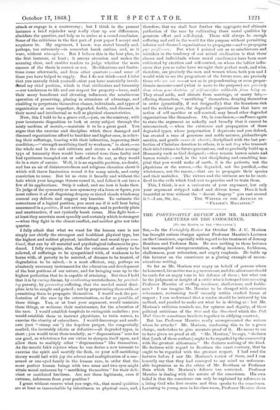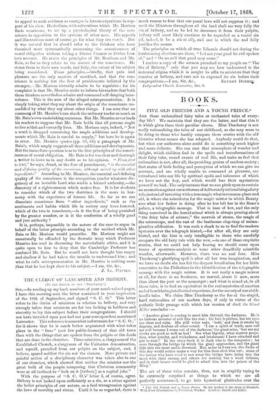THE FORTNIGHTLY REVIEIV AND MR. MAURICE'S LECTURES ON THE CONSCIENCE.
[TO THE EDITOR OF THE SPECTATOR:]
SIR,—In the Fortnightly Review for October Mr. J. C. Morison has brought serious charges against Professor Maurice's Lectures on the Conscience, especially with regard to his treatment of Jeremy Bentham and Professor Bath. He sees nothing in those lectures but unexampled misrepresentation, scoffing insolence, feebleness, shallowness, poor reiteration, and empty emphasis. He holds up this lecturer on the conscience as a glaring example of uncon- scientious writing.
So far as Mr. Morison was angry on behalf of persons whom lie honoured, his motive was a gmerous one, and due allowance should be made for an angry tone in his defence of them ; but what can be the judgment or insight of a critic who is betrayed into accusing Professor Maurice of scoffing insolence, slialbwness, and feeble- ness? I can imagine Mr. Maurice to be charged with excessive vehemence, restraining itself uneasily within studied forms of respect ; I can understand that a reader should be irritated by his method, and puzzled to make out what he is driving at : but Mr. Morison's criticism reminds me, for aptness and dignity, of those political criticisms of the Star and the Standard which the Pall Mall Gazette sometimes brackets together in edifying contrast.
But has Professor Maurice really misrepresented the writers whom he attacks? Mr. Morison, confessing this to be a grave charge, undertakes to give accurate proof of it. lie seems to me to have given no proof at all. "Mr. Maurice," he says, "declares that [each of these authors] ought to be regarded by the community with the greatest abhorrence." Ile declares nothing of the kind. He declares with regard to Bentham the exact contrary, that he ought to be regarded with the greatest respect. I had read the lectures before I saw Mr. Morison's review of them, and I can honestly say that they had conveyed to my mind no unfavour- able impression as to the ethics of Mr. Bentham or Professor Bain which Mr. Morison's defence has corrected. Professor Maurice is dealing with the nature of the conscience. His own belief is that the conscience can only be explained by reference to a living God who first creates and then speaks to the conscience. Lecturing to young men in his class-room, Professor Maurice chose to appeal to such evidence as emerges in human experience in sup- port of his view. He declines, with reiterations which Mr. Morison finds wearisome, to set up a psychological theory of the con- science in opposition to the systems of other men. His appeals and illustrations must of course go for what they are worth. But it was natural that be should refer to the thinkers who have theorized most systematically concerning the consciousness of moral obligation without taking a Divine Creator or Divine Law into account. He states the principles of Mr. Bentham and Mr. Bain, so far as they relate to the nature of the conscience. He states them in their own words, and fully, the extent of his subject being considered. These principles,—briefly, that pain and pleasure are the only masters of mankind, and that the con- science is nothing but the fear of punishments inflicted by the stronger,—Mr. Morison virtually admits to be repulsive ; for his complaint is that Mr. Maurice omits to inform his readers that both these thinkers nevertheless admire and commend self denying bene- volence. This is the sum of the alleged misrepresentation.. It is simply taking what they say about the origin of the conscience un- modified by what they say about other things. I am sure that no comment of Mr. ALturice's can shock the ordinary reader so much as Mr. Bain's own unshrinking sentences. But Mr. Maurice never leads his readers to suppose that Mr. Bain holds that all persons ought to live selfish and cowardly lives. Mr. Morison says, indeed, "Not a word is dropped concerning the ample additions and develop- ments which Mr. Bain is careful to supply," but here he is again in error. Mr. Maurice quotes (pp. 63, 64) a paragraph of Mr. Bain's, which amply suggests all those additions and developments. But the immediate question is as to the first principles of the consci- nusness of moral obligation. Mr. Bain is far too clear and thorough a writer to leave us in any doubt as to his opinion. "From first to lctst," he says, dread, or the fear of punishment, "is the essential and a'Oning quality of the conscience, although mixed up with other ingredients." According to Mr. Maurice, the essential and defining quality of the conscience is the recognition (under whatever dis- guises) of an invisible Lord who wields a blessed authority,—the discovery of a righteousness which makes free. It is for students to consider which of the two doctrines is the more in har- mony with the experience of human life. So far as we can dissociate conscience from " other ingredients," such as the sentiments and habits which life in society may have fostered, which of the two is conscience,—is it the fear of being punished by the greater number, or is it the confession of a wholly good and just authority ?
It is, perhaps, impossible in the nature of the case to argue in behalf of the latter principle according to the method which Mr. Bain or Mr. Morison would prescribe. Mr. Morison might not unnaturally be offended by the Socratic irony which Professor Maurice has used in discussing the materialistic ethics, and it is quite open to him to deny that the Cambridge Professor has confuted Mr. Bain. But he would not have thought him empty and shallow if he had taken the trouble to understand him ; and what be calls misrepresentation in Mr. Maurice is nothing more than that he has kept close to his subject.—I am, Sir, &c., J. Li- DAviEs.



































 Previous page
Previous page